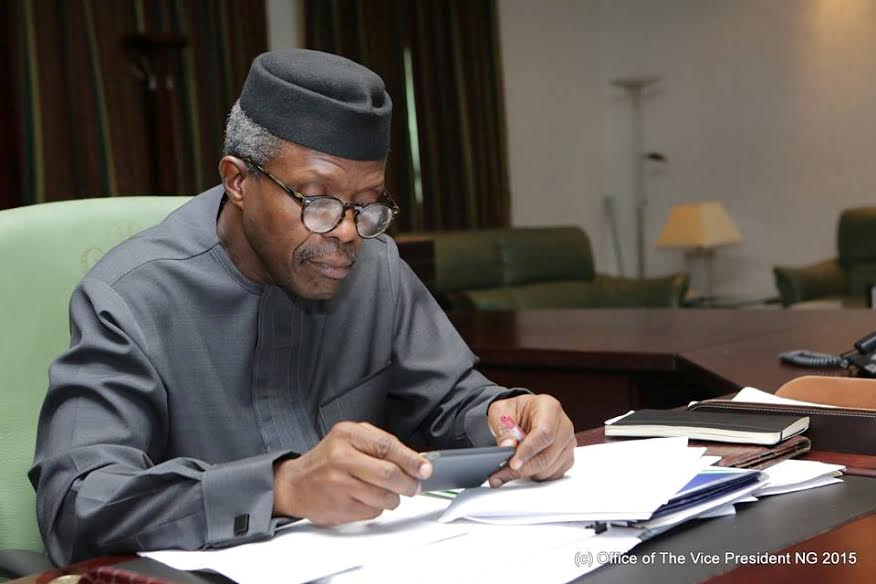- Osinbajo: Nigerian Democracy is Still Work in Progress
The Vice President, Prof. Yemi Osinbajo, has said Nigerian democracy has remained work in progress that requires concerted efforts and selfless leadership to achieve the desired results and dividends.
Osinbajo stated this yesterday at the inaugural flagship lecture of the Kukah Centre, held at the Shehu Yar’Adua Conference Centre, Abuja.
The event had President Nana Akufo-Addo of Ghana and Nigeria’s former Head of State, General Yakubu Gowon (rtd), in attendance.
Other dignitaries who attended the event include: the host and founder of Kukah Centre and Bishop of Sokoto Diocese, Most Reverend Matthew Hassan Kukah, Governor Abubakar Atiku-Bagudu of Kebbi State, and Bishop Godfrey Onah of Nsukka Diocese, Diocese, South-east.
Speaking further, the vice president however, noted that democracy like in all countries, including the oldest democracies, keep on throwing up new challenges and raising “the biggest lessons of recent years.”
He said: “As elections and referenda threw up now and then unprecedented scenarios across the world; the narrowness of the Brexit vote for example and the way it has subsequently divided the United Kingdom and the electoral rise of populist right wing and even extremist tendencies are all examples of great threats to democracy.”
Osinbajo while citing the 2017 Annual Democracy Index of the Economist Intelligence Unit (EIU), said no region of the world recorded improvement in “its average score since 2016 as countless countries grapple with increasingly divided electorate.
“So, it’s clear that across the world, democracy is on somewhat turbulence trajectory. But for Africa, the challenges to democracy pose a graver threat because of the historic failure to invest, in my view, sufficiently, in nation building and state building.”
According to the vice president, many of the parochial and ethnic tensions that have tended to create insecurity and outright conflict in most African countries were largely on account of the failure to deliberately undertake nation building efforts by the political elite.
“The elite, it appears, prefer the status quo which sets the lowest possible bar for political advancement. Identity politics that emphasises where leaders come from has been the paradigm through which most issues are analysed,” he noted.
Osinbajo also called for the strengthening of institutions to ensure the rule of law and quick dispensation of justice was imperative for security and peace of African nations.
To achieve this, he challenged the African leadership elite to take more deliberate actions towards nation building, saying that they have run out of excuses.
“We can no longer go on with the African exceptionalism, which we have seen time and time again and which we have heard time and time again; that there’s a different rule for Africa or that a different rule applies to Africa,” he said.
According to him, Africans expect their leaders to deliver on their promises to them on the basic things needed for peace, stability and unity of nations.
“The people of our nations expect us to deliver on the important promises that politicians make, which is delivering social goods, ensuring that our youth population which is ever growing are able to get jobs, ensuring that there’s rule of law and that there is security. These are issues that remain prominent everywhere in Africa,” he explained.
Also speaking, Gowon said democracy was being deepened in Ghana and Nigeria with peaceful elections in 2016 and 2015.
In the same vein, the Senate President, Bukola Saraki, represented by Senator Monsurat Sunmonu, also spoke, stating the oversight functions of the National Assembly in checking excesses in government.


 Billionaire Watch3 weeks ago
Billionaire Watch3 weeks ago
 Startups4 weeks ago
Startups4 weeks ago
 News4 weeks ago
News4 weeks ago
 News4 weeks ago
News4 weeks ago
 Bitcoin4 weeks ago
Bitcoin4 weeks ago
 Naira4 weeks ago
Naira4 weeks ago
 Forex3 weeks ago
Forex3 weeks ago
 Treasury Bills4 weeks ago
Treasury Bills4 weeks ago
























